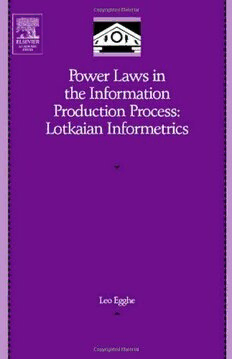
Power Laws in the Information Production Process: Lotkaian Informetrics (Library and Information Science) PDF
447 Pages·2005·12.2 MB·English
Most books are stored in the elastic cloud where traffic is expensive. For this reason, we have a limit on daily download.
Preview Power Laws in the Information Production Process: Lotkaian Informetrics (Library and Information Science)
Description:
This book describes informetric results from the point of view of Lotkaian size-frequency functions, i.e. functions that are decreasing power laws. Explanations and examples of this model are given showing that it is the most important regularity amongst other possible models. This theory is then developed in the framework of IPPs (Information Production Processes) hereby also indicating its relation with e.g. the law of Zipf.Applications are given in the following fields: three-dimensional informetrics (positive reinforcement and Type/Token-Taken informetrics), concentration theory (including the description of Lorenz curves and concentration measures in Lotkaian informetrics), fractal complexity theory (Lotkaian informetrics as self-similar fractals), Lotkaian informetrics in which items can have multiple sources (where fractional size-frequency functions are constructed), the theory of first-citation distributions and the N-fold Cartesian product of IPPs (describing frequency functions for N-grams and N-word phrases).In the Appendix, methods are given to determine the parameters in the law of Lotka, based on a set of discrete data. The book explains numerous informetric regularities, only based on a decreasing power law as size-frequency function, i.e. Lotka's law. It revives the historical formulation of Alfred Lotka of 1926 and shows the power of this power law, both in classical aspects of informetrics (libraries, bibliographies) as well as in 'new' applications such as social networks (citation or collaboration networks and the Internet).
See more
The list of books you might like
Most books are stored in the elastic cloud where traffic is expensive. For this reason, we have a limit on daily download.
